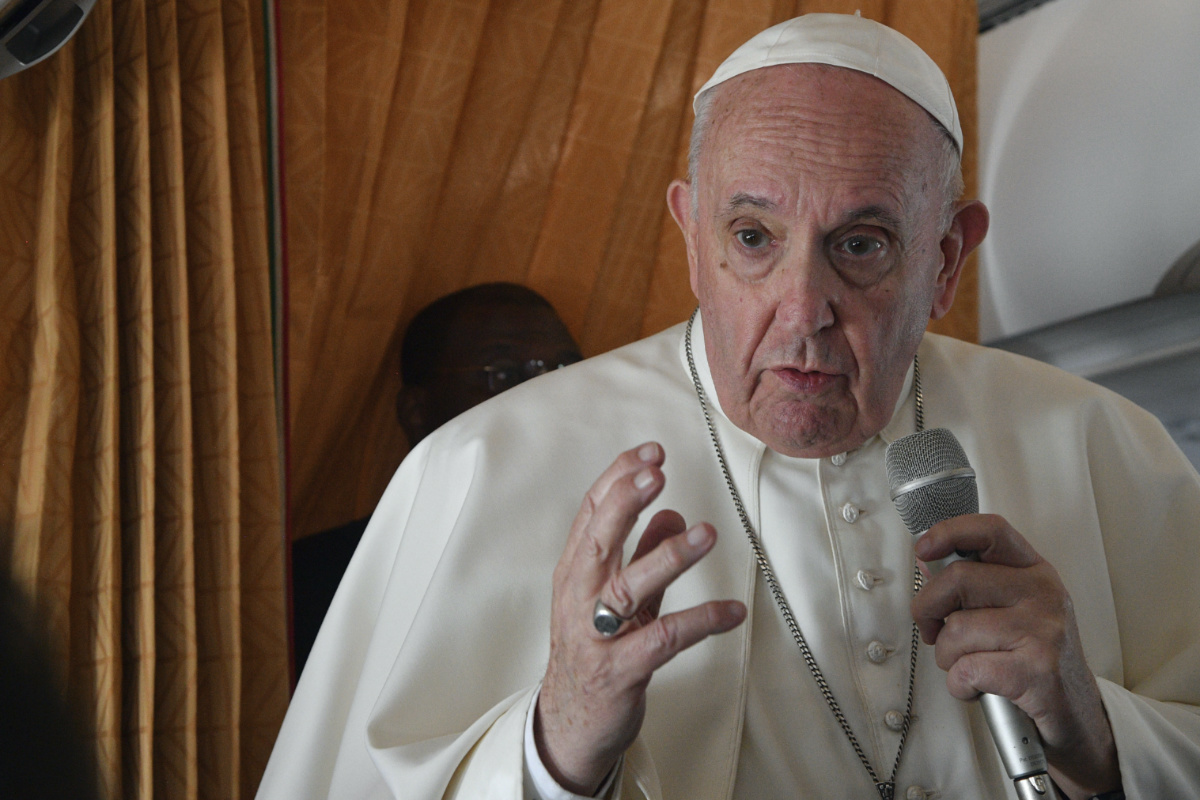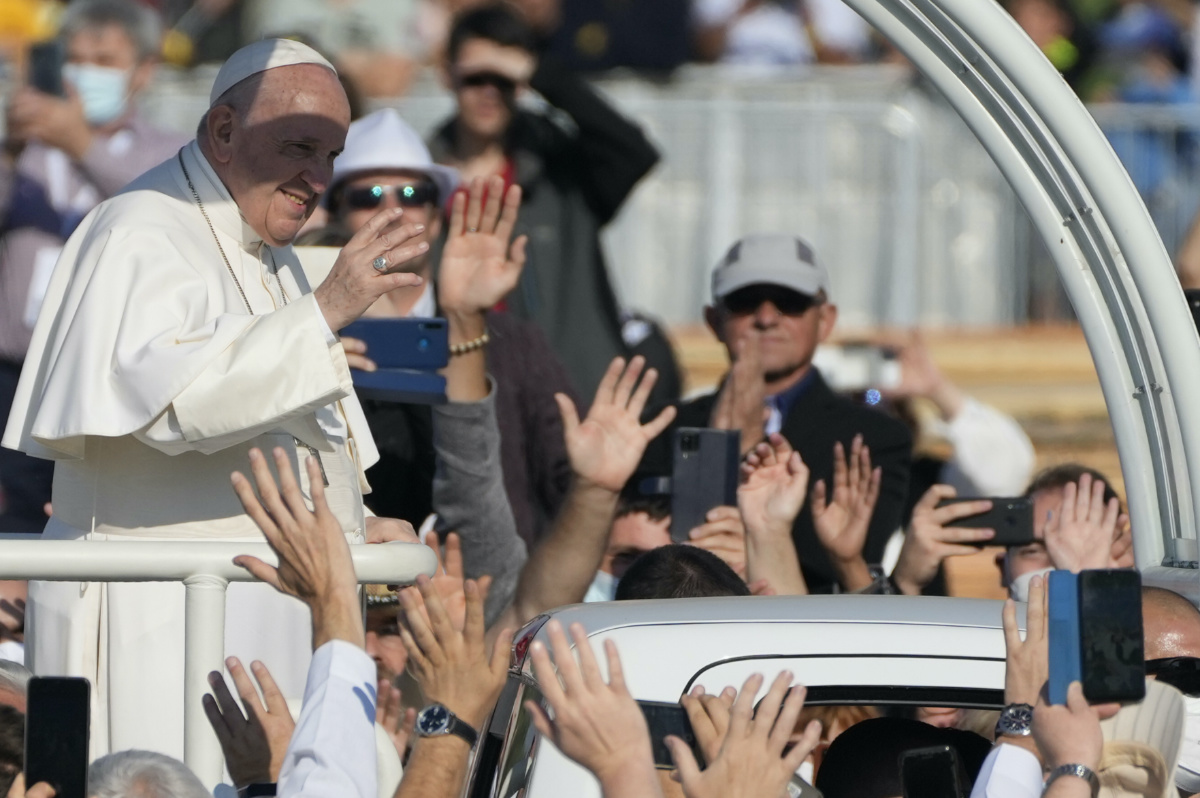Pope Francis said Wednesday that Catholic bishops must minister with “compassion and tenderness,” not condemnation, to politicians who support abortion rights and warned that clerics shouldn’t let politics enter into questions about receiving Communion.
Francis was asked en route home from Slovakia about the debate in the US church about whether President Joe Biden and other politicians should be denied Communion because of their stances on abortion. US bishops have agreed to draft a “teaching document” that many of them hope will rebuke Catholic politicians, including Biden, for receiving Communion despite their support for abortion rights.

Pope Francis speaks with journalists on board an Alitalia aircraft enroute from Bratislava back to Rome, on Wednesday, 15th September, 2021 after a four-day pilgrimage to Hungary and Slovakia. PICTURE: Tiziana Fabi, Pool via AP.
Francis declined to give a “yes” or “no” answer, saying he didn’t know the US case well enough. He repeated that abortion was “homicide”, and that Catholic priests cannot give the Eucharist to someone who is not in communion with the church. He cited the case of a Jew, or someone who isn’t baptised or who has fallen away from the church.
Most importantly, he said, was that priests and bishops must respond pastorally and not politically to any problem that comes before them. He said they must use “the style of God” to accompany the faithful with “closeness, compassion and tenderness.”
POPE QUESTIONS VACCINE SCEPTICS, INCLUDING CARDINALS
Pope Francis said Wednesday he didn’t understand why people refuse to take COVID-19 vaccines, saying “humanity has a history of friendship with vaccines”, and that serene discussion about the shots was necessary to help them.
“Even in the College of Cardinals, there are some negationists,” Francis said Wednesday, en route home from Slovakia.
He noted that one of them, “poor guy”, had been hospitalised with the virus. That was an apparent reference to US Cardinal Raymond Burke, who was hospitalized in the US and placed on a ventilator last month after contracting the virus.
Francis was asked about vaccine sceptics and those who oppose vaccine mandates by a Slovakian reporter, given that some events during his four-day pilgrimage to the country were restricted to people who had gotten COVID-19 jabs. The issue is broader, however, as more and more governments adopt vaccine mandates for certain categories of workers, sparking opposition.
“It’s a bit strange, because humanity has a history of friendship with vaccines,” Francis said, noting that children for decades have been vaccinated against measles, mumps and polio “and no one said anything.”
He hypothesised that the “virulence of uncertainty” was due to the diversity of COVID-19 vaccines, the quick approval time and the plethora of “arguments that created this division”, and fear. Medical experts say vaccines have been tested and used on tens of millions of people and have been proven to be effective in reducing serious hospitalizations and deaths.
Significantly, Francis didn’t cite the religious objection used by some who refuse the vaccines. Some conservatives have refused to get the shots citing the remote and indirect connection to lines of cells derived from aborted fetuses.
The Vatican’s doctrine office has said it is “morally acceptable” for Catholics to receive COVID-19 vaccines based on research that used cells derived from aborted fetuses. Francis has said it would be “suicide” not to get the jab and both Francis and Emeritus Pope Benedict XVI have been fully vaccinated with Pfizer-BioNTech shots.
Francis noted that the Vatican had vaccinated its residents, staff and their families “with the exception of a very small group” and “they’re studying how to help them”.
For those who are still afraid, he said: “They have to clarify that and talk with serenity.”
– NICOLE WINFIELD, AP
“And what should pastors do? Be pastors, and not go condemning, condemning,” Francis said.
Francis recalled cases when the church had held fast to a principle on political grounds and it ended badly, citing the Inquisition-era condemnation of Giordano Bruno for alleged heresy. He was burned at the stake in Rome’s Campo dei Fiori.
“Whenever the church, in order to defend a principle, didn’t do it pastorally, it has taken political sides,” Francis said. “If a pastor leaves the pastorality of the church, he immediately becomes a politician.”
Francis said he had never denied Communion to anyone, though he said he never knowingly had a pro-abortion politician before him, either. And he admitted he once gave Communion to an elderly woman who, after the fact, confessed that she was Jewish.
Francis repeated his belief that the Eucharist “is not a prize for the perfect” but rather “a gift of the presence of Jesus in the church”. But he was unequivocal that it cannot be given to anyone who is not “in communion” with the church, though he declined to say if a pro-abortion politician was out of communion.
He was similarly unequivocal that abortion is murder, and that even a weeks-old embryo is a human life that must be protected.
“If you have an abortion, you kill,” Francis said. “That’s why the church is so tough on this issue, because if you accept this, you accept homicide daily.”
US bishops agreed in June that the conference doctrine committee will draft a statement on the meaning of Communion in the life of the church that will be submitted for consideration, probably an in-person gathering in November. To be formally adopted, the document would need support of two-thirds of the bishops.
Despite the short flight back from Bratislava, the Slovak capital, Francis fielded an unusually wide array of questions. Among other things he said:
• That states can and should pass civil laws to allow homosexual couples to have inheritance rights and health care coverage, but that the church couldn’t accept gay marriage because marriage is a sacrament between a man and woman. “Marriage is marriage. This doesn’t mean condemning people who are like this. No, please! They are our brothers and sisters and we have to accompany them.”
• That his surgery to remove 33 centimetres of his colon in July wasn’t easy, despite those who have marveled at how well he had recovered. “It wasn’t cosmetic surgery,” he quipped.
Earlier, Pope Francis urged Slovakians to look out for the neediest among them as he ended his first post-surgery trip with a huge open-air Mass that drew tens of thousands of people amid the ongoing coronavirus pandemic.
Cheering, maskless crowds lined Francis’ motorcade route through Sastin, 15 kilometres from Slovakia’s western border, and they were rewarded with a slow-moving popemobile jaunt and a smiling, waving Francis as he arrived at the vast field.
Organisers said 60,000 people attended the Mass, the biggest crowd at any event during the pope’s four-day pilgrimage to Slovakia.

Pope Francis arrives to celebrate a Mass in the esplanade of the National Shrine in Sastin, Slovakia, Wednesday, on 15th September. Pope Francis celebrates an open air Mass in Sastin, the site of an annual pilgrimage each 15th September to venerate Slovakia’s patron, Our Lady of Sorrows. PICTURE: AP Photo/Gregorio Borgia.
The venue was the Our Lady of Sorrows national shrine, Slovakia’s most important one dedicated to the Virgin Mary, where St John Paul II prayed in 1995. Each 15th September, pilgrims from Slovakia and beyond flock to Sastin on the feast day of Slovakia’s patron, with some this year spending the night on the dusty field to get a better spot.
“You can imagine that I’m excited because he’s from Latin America,” said Erick Montalvo, a pilgrim from Mexico. “You feel it like you are kind of close to him because of that. And that’s a very nice feeling.”
During his homily, Francis urged the pilgrims to open their hearts to compassion and live a faith “that identifies with those who are hurting, suffering and forced to bear heavy crosses.”
He called them to live a “faith that does not remain abstract, but becomes incarnate in fellowship with those in need.”
The Mass was Francis’ only big event Wednesday before he returned to Rome after a four-day pilgrimage to Budapest, Hungary and Slovakia, a largely Roman Catholic country of 5.5 million people.
– With KAREL JANICEK in Prague, Czech Republic, and PHILIPP JENNE.





